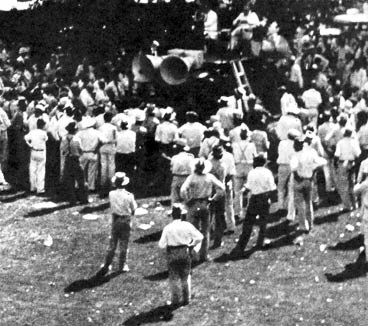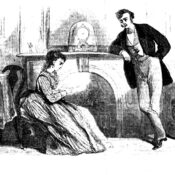Arkansas had never seen its like before. With just days remaining in the 1932 Arkansas’ Democratic primary, Huey Long crossed the Mississippi and launched a campaigning blitz across the state that stunned voters and sent shivers through the state’s political establishment.
Seven motor trucks and Senator Long’s private automobile composed the campaign caravan. Two of the trucks were specially designed sound trunks developed by him for his Louisiana forays.
Remember as you read these excerpts from the October 15, 1932 Post that Frankin D. Roosevelt had not yet been elected president. Huey Long was the rising power in radical politics and many Americans people assumed he was an unstoppable demagogue that would destroy the country’s government and business. The media watched him with dread and fascination; he was ‘good copy’ but his ability to stir anger and sell his version of populist socialism could prove dangerous. In Arkansas, the Democratic party was about to learn just how dangerous he could be. On August 1, he brought his support to Hattie Caraway’s campaign for re-election by sweeping into Arkansas with his convoy of trucks:
Each is equipped with four amplifying horns. Inside the vehicle body are the loudspeaker panels, an attachment for playing phonograph records, several folding chairs, a folding table, a pitcher and glasses. On the roof of each truck is a slatted platform with two of the four amplifying horns on each side, and with nested takedown iron railings and a portable stairway. Where no speaker’s platform has been provided, the folding table is opened, and the pitcher filled with ice water and set atop, with glasses beside it and a microphone before. The stairway is hooked into a special iron rail at the side of the truck and lo, there is a complete and commandingly placed speaker’s platform.
Naturally, Mrs. Caraway’s six opponents, accustomed to the frock-coated school of campaigning for high office, with just a dash of baby kissing, perhaps, as a concession from Olympus to the humanities, were bewildered by this high-pressure disturbance which moved across the land with such clocklike regularity, military precision and devastating efficiency. By the time they had rallied their political faculties und begun to strike buck, the damage had been done.
Hattie Caraway wasn’t just a bystander in this campaign. She quickly found her feet, spoke out, and developed her own style.
At the start of the march, one could not even properly have referred to her brief preliminary remarks as a speech. They were awkwardly couched and awkwardly delivered, a bumpy performance, which not even her shy closing remark that “I know I don’t talk like a statesman, but I’ve always tried to vote like one for you,” could quite make palatable.
Two days later she was an effective stump speaker in her own right. She had caught the knack of leading up to a climax, and then waiting for the burst of applause which is practically sure to follow when the audience is friendly. She did not need much tutoring, for she possessed a happy gift for phrase making.
Nothing in the way of spectacular showmanship that could or would draw crowds to the meetings was overlooked, and the Arkansas electorate was jamming the highway to see and hear this much-discussed Kingfish, in the bundle compartment of whose automobile reposed, side by side, a well-thumbed Bible and a loaded atomizer of throat spray. However, the real task was not merely one of assembling crowds, but of proselyting, of evangelizing, of making converts and staunch believers out of voters to whom it had never occurred that a woman could be a serious contender for a Senate seat
So there were many, that week when Huey Long dashed over Arkansas, who came to scoff and who remained as prey. Farmers drove to town in their own automobiles—and no few of the cars were this year’s models—in such numbers that highways were congested in every direction. Fifteen minutes after he began to talk, Huey Long would have these same farmers convinced that they were starving and would have to boil their old boots and discarded tires to have something to feed the babies till the Red Cross brought around a sack of meal and a bushel of sweet potatoes to tide them over; that Wall Street’s control of the leaders—not the rank and file—of both Democratic and Republican parties was directly responsible for this awful condition; that the only road to salvation lay in the reelection of Hattie W. Caraway.
Huey knew what worked with these voters and he delivered it better than anyone. He offered sympathy, outrage, a list of enemies to despise and heroes to admire, rounded off with old-time religion and garnished with humor.
“Think of it, my friend! In 1930 there were 540 men in Wall Street who made $100,000,000 more than all the wheat farmers and all the cotton farmers and all the cane farmers of this country put together! Millions and millions and millions of farmers in this country, and yet 540 men in Wall Street made $100,000,000 more than all those millions of farmers. And you people wonder why your belly’s flat up against your backbone!”
“You don’t have to look far as to how you can correct this condition. Herbert Hoover is calling together boards and commissions to find out what he should do about it. The only dad-blamed thing on the living face of the earth that he needs to do is read his Bible. The Lord tells us in Chapters 24, 26 and 27 of Leviticus, in Chapter 5 Of Nehemiah, and Chapter 5 of James, not only what to do but how to do it. He tells you that unless you redistribute the wealth of a country into the hands of all the people every fifty years, your country’s got to go to ruination. The trouble is we’ve got too many men running things in this country that think they’re smarter than the Lord.”
“I’m for [Winnie Caraway] like I was for an uncle of mine, the time he joined the church and got baptized… This uncle of mine was over forty, and we were all worried about him because we heard he was sitting in on card games at night, and if he didn’t hurry up and join the church before it got too late, he’d die an unsaved man and the devil’d get him sure. However, one time a real good preacher come through our town and preached one of these special hell-fire-and-damnation sermons, and he scared my uncle up, so that be joined the church and offered himself as a candidate for baptism.
Well, the next Sunday afternoon about three o’clock they took my uncle out to Dugdemona Creek to baptize him, and my aunt, his wife, was sitting on the bank with their little boy, and a big crowd was standing all around. And as the preacher led my uncle out into the waters of old Dugdemona, there floated out of my uncle’s pocket the ace of spades, face up. And a couple of steps farther, out come the king of spades and the queen, and finally the jack and ten-spot of spades following along behind.
“My aunt jumped up and flung out her arms and cried: “Don’t baptize him, parson! It’s no use! He’s lost! My husband’s lost!”
But the little boy said: ‘Now, don’t you get excited, ma. Pa ain’t lost. If he can’t win with that hand he’s got there, he can’t win at all.” And I’m here to tell you, my friends, that if we can’t win with Mrs. Caraway’s record of standing by you people through thick and through thin, then we can’t win at all and we might just as well admit Wall Street is too strong for us.”
Previous: How the Kingfish Helped Elect the First Woman Senator
Become a Saturday Evening Post member and enjoy unlimited access. Subscribe now



